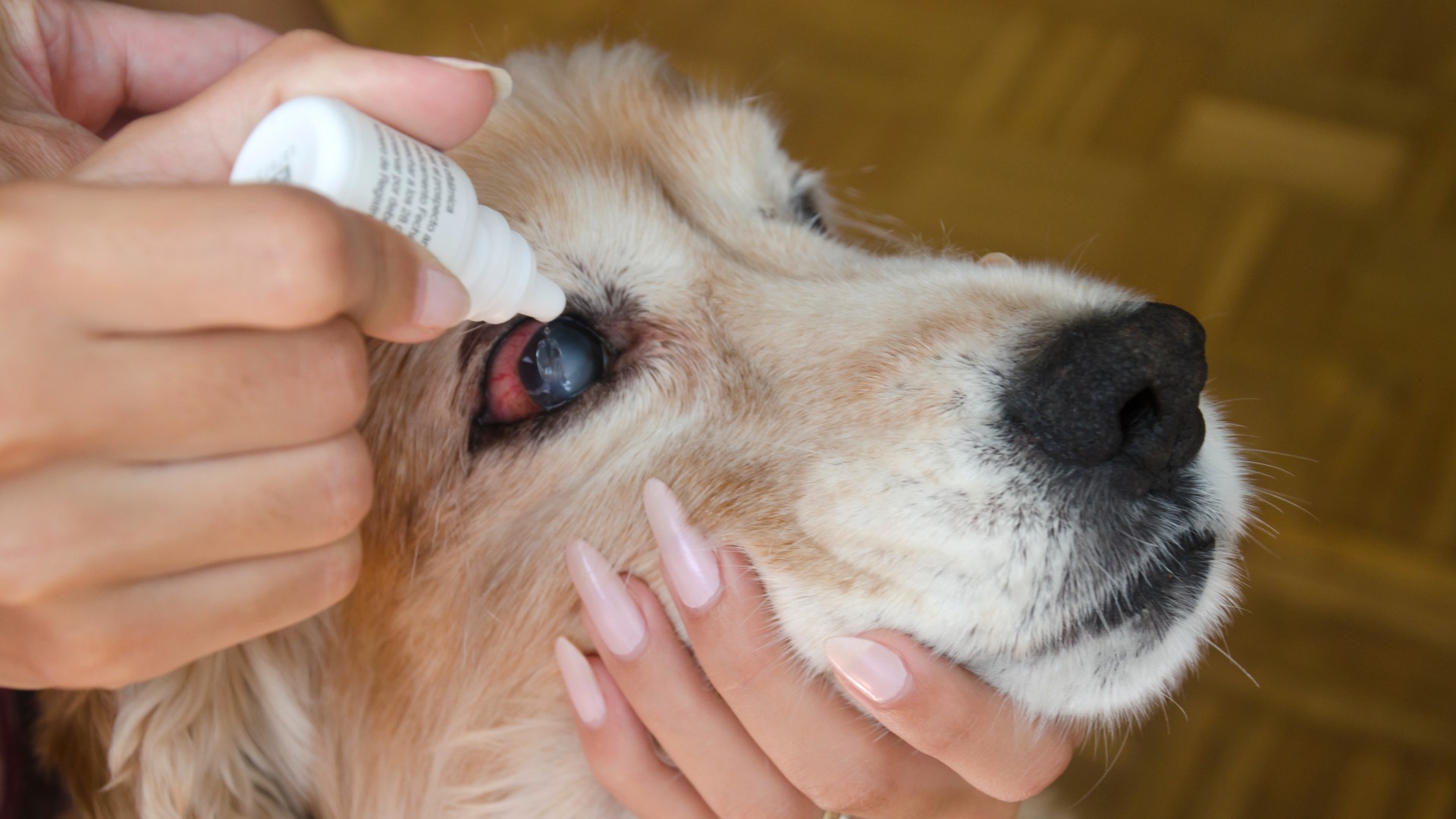Why are my dog’s eyes red? Vet's guide to causes and treatment
Have you ever wondered “why are my dog’s eyes red?” Our vet explains

“Why are my dog’s eyes red?” is a common question among dog owners. Redness of the eyes can be mild and fleeting, there one minute and gone the next.
In other cases, though, the eyes may remain red for days or even weeks at a time. Prolonged or dramatic redness is more likely to indicate a medical condition that requires veterinary care.
A simple visit to your veterinarian can help diagnose the cause of your dog’s red eyes, and determine the best course of treatment. Fortunately, the cost of diagnosis and treatment is often covered by the best pet insurance.
Read on to learn more about possible causes of red eyes, and what to expect from a visit with your veterinarian.
- Why is my dog itching, scratching, and biting himself constantly?
- Why is my dog grinding their teeth? Vet's guide to causes and treatment
- Why is my dog shaking and panting? Vet's guide to dog shivering
Causes of red eyes in dogs
Red eyes in dogs can have a number of potential causes. These causes range in severity from mild to severe; some will resolve without treatment, while others could permanently threaten your dog’s vision.
Many cases of eye redness are caused by conjunctivitis. Conjunctivitis refers to inflammation of the membrane that lines the eyelid and the eyeball. There are multiple possible causes of conjunctivitis. Fortunately, most cases respond well to treatment if it is started early.
Other cases of eye redness may be associated with more serious conditions, such as glaucoma (increased eye pressure), injury to the eye, or a foreign body within the eye. These conditions require urgent treatment. Failure to treat any of these conditions promptly could result in the permanent loss of your dog’s vision.
Can dogs get red eyes from allergies?
Allergies are the most common cause of canine conjunctivitis. Dogs with allergic conjunctivitis often have red eyes, swollen eyelids, and increased discharge from the eyes. Your dog may also squint or paw at their eyes, due to discomfort.
Allergic conjunctivitis may be seen in combination with other signs of allergies, such as sneezing. Your dog may also have red, itchy skin and/or hair loss. In some cases, dogs with skin allergies may have an unusual odor to their skin. See why does my dog smell? for further information.
If your dog has red eyes and/or other signs of allergies, a visit to the veterinarian is definitely in order.
Do dogs' eyes get red when stressed?
If you have noticed your dog’s eyes becoming red when stressed, you’re not alone! This is actually a relatively common occurrence in dogs.
When a dog is stressed, panting and other signs of anxiety are often accompanied by an increase in heart rate and blood pressure. As more blood flows through the membranes surrounding the eyes, you may notice a mild increase in eye redness.
If your dog’s eye redness is caused by stress, it should resolve when your dog calms down. Also, keep in mind that eye redness due to stress typically occurs in dogs that are very anxious.
If your dog is a relaxed couch potato, stress is unlikely to cause eye redness. On the other hand, if you find yourself asking “why does my dog stare at me?" or "why does my dog follow me everywhere?," these behaviors may be indicators that your dog is on the anxious side.
However, even an anxious dog shouldn’t have eyes that remain consistently red. If your dog’s eyes remain red for more than a day, it’s time to consult your veterinarian.

How do I treat my dog's red eye?
Treating your dog’s eyes will require a diagnosis. Your veterinarian will begin by performing a physical examination, including a thorough ophthalmic (eye) exam.
If no obvious cause is found on exam, your veterinarian is likely to recommend three different tests:
- Fluorescein stain: This test allows your veterinarian to determine whether there are ulcers, scratches, or other defects present on the surface of your dog’s cornea.
- Schirmer Tear Test: This test measures your dog’s tear production, to ensure that your dog is not suffering from dry eye (also known as keratoconjunctivitis sicca, or KCS).
- Tonometry: This test assesses your dog’s eye pressure, looking for evidence of glaucoma.
The results of these tests will determine the best treatment for your dog. If your dog has dry eye, your veterinarian will prescribe eye drops to increase tear production. If your dog has a corneal wound or ulcer, your veterinarian will prescribe topical antibiotics to help the wound heal.
Glaucoma is typically treated with eye drops, although your veterinarian may also refer you to a veterinary ophthalmologist for more advanced care. Allergic conjunctivitis is treated with steroid eye drops or ointment, while bacterial infections are treated with antibiotic drops or ointment.
Do not attempt to treat your dog’s eyes at home, without veterinary guidance. Using eye medications incorrectly can harm your dog; for example, steroid drops can lead to rapid and dramatic worsening of a corneal ulcer.
Sterile saline can help flush foreign material out of the eyes, but high-pressure flushing of the eyes can actually cause a foreign body to become more firmly embedded in the eye. With any eye issue, your best option is to forego home treatment and contact your veterinarian.
Summary
As you have learned, there is no single answer to the question, “why are my dog’s eyes red?” Several different conditions can cause a dog’s eyes to be red, and these conditions range from mild to severe.
If your dog’s eyes remain red for more than a day, or if eye redness is accompanied by other signs (such as squinting, pawing at the eye, swelling, or increased discharge from the eyes), it’s time to schedule an appointment with your veterinarian for diagnosis and treatment.
PetsRadar Newsletter
Get the best advice, tips and top tech for your beloved Pets
Dr. Barnette is a graduate of the University of Florida, where she received both her B.S. in Zoology and her Doctor of Veterinary Medicine (DVM). She has 15 years of clinical experience as a small animal veterinarian, treating dogs, cats, and occasional exotic patients. She now works as a freelance veterinary writer, creating educational content for veterinarians, veterinary team members, and dedicated pet owners. Dr. Barnette lives in southwest Florida with her husband and daughter (plus two cats, a dog, and a rescued dove!) and enjoys kayaking, biking, and hiking. Learn more about Dr. Barnette at www.linkedin.com/in/catherinebarnette.

